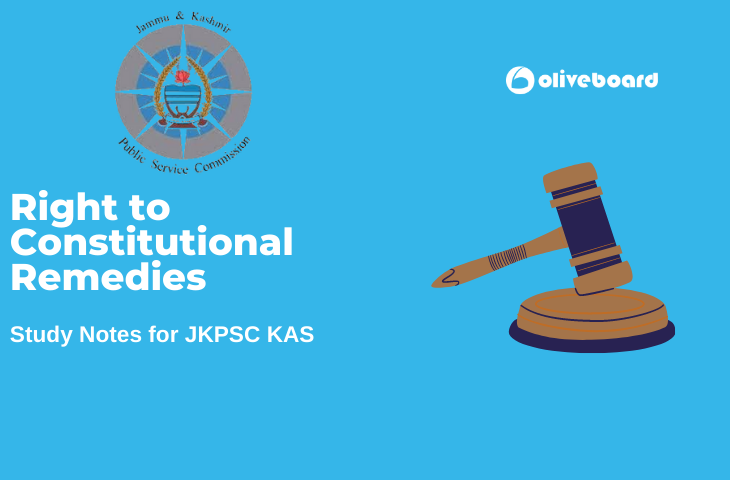Right to Constitutional Remedies: The Constitution of India grants 6 Fundamental Rights to the citizens of India. In this blog, we are going to learn about the Right to Constitutional Remedies which is covered under Article 32.
Part III of the Indian Constitution has provided legal remedies for the protection of the fundamental rights granted to the citizens. According to that, a citizen can move to the Supreme Court or High Court in case there has been a violation of fundamental rights.
Crack JKPSC KAS with a Free Mock Test Here
Article 32 – Right to Constitutional Remedies
Article 32 of the Indian Constitution deals with the constitutional remedies that are prescribed in case there is a violation of the fundamental rights of any citizen of India.
The scope of article 32 is that it empowers Supreme Court to issue writs in order to enforce fundamental rights in case of violation.
In addition to that, article 226 also provides the powers to High Court to issue writs in case there is a violation of fundamental rights.
Now let us know about the writ and its types.
Crack JKPSC KAS with a Free Mock Test Here
What is a Writ?
A writ can be said to be a written order issued by a judiciary body ( Supreme Court and High Court in India). Writs are issued by the judicial bodies in order to enforce fundamental rights in case of violation.
Also, it is issued so that the State respects and protects its citizens and their rights.
There are 5 types of writs that can be issued by the Supreme Court and High Court and they are:
- Mandamus
- Habeas Corpus
- Quo Warranto
- Certiorari
- Prohibition
Let’s get to know more about each type in the following lines:
Mandamus
Mandamus is a Latin term that means ‘we command’ and accordingly mandamus is a writ that is issued in the form of a command to any constitutional, statutory or non-statutory authority to perform a certain task as bound by law.
Mandamus cannot be issued against a private individual.
Habeas Corpus
Habeas Corpus is a Latin term meaning ‘to have the body.’ It is a writ that can be issued to protect an individual against unlawful detention. The writ of habeas corpus orders a public official to present a detained person in front of the court and show the reasons for the detention.
In cases of illegal detention, the court can ask the state to compensate the individual for illegal detention.
However, if the individual is found to be in contempt of court then the same cannot be applied.
Crack JKPSC KAS with a Free Mock Test Here
Quo Warranto
Quo warranto means by what authority. The writ of Quo Warranto is issued to restrain a person from holding a public office which is obtained by usurping.
Through this writ, the court wants to enquire about the legality of the claim by a person for a position in public office.
Certiorari
Certiorari means to be certified. The Writ of Certiorari is issued to overturn any order that has been made by the lower court. It is issued in cases the decision made in a lower court is challenged by the individual.
Crack JKPSC KAS with a Free Mock Test Here
Prohibition
Prohibition means to forbid. The Writ of Prohibition is issued by the superior court to an inferior court in order to prevent the inferior court from exceeding its jurisdiction with the case. It can be described as a stay order.
It can only be issued to judicial and quasi-judicial bodies.
Recommended Reading
- Right to Equality
- Right to Freedom
- Right against Exploitation
- Right to Freedom of Religion
- Cultural and Educational Rights
Conclusion
That was all about the right to constitutional remedies. For more updates, stay connected to Oliveboard.
Also Check:
- 100+ Free Mock Tests
- Oliveboard Mobile App
- Oliveboard’s discuss forum
- Oliveboard Telegram Group
- Download BOLT – Our Monthly General Awareness free e-book
Connect with us on

Hello there! I’m a dedicated Government Job aspirant turned passionate writer & content marketer. My blogs are a one-stop destination for accurate and comprehensive information on exams like Regulatory Bodies, Banking, SSC, State PSCs, and more. I’m on a mission to provide you with all the details you need, conveniently in one place. When I’m not writing and marketing, you’ll find me happily experimenting in the kitchen, cooking up delightful treats. Join me on this journey of knowledge and flavors!
